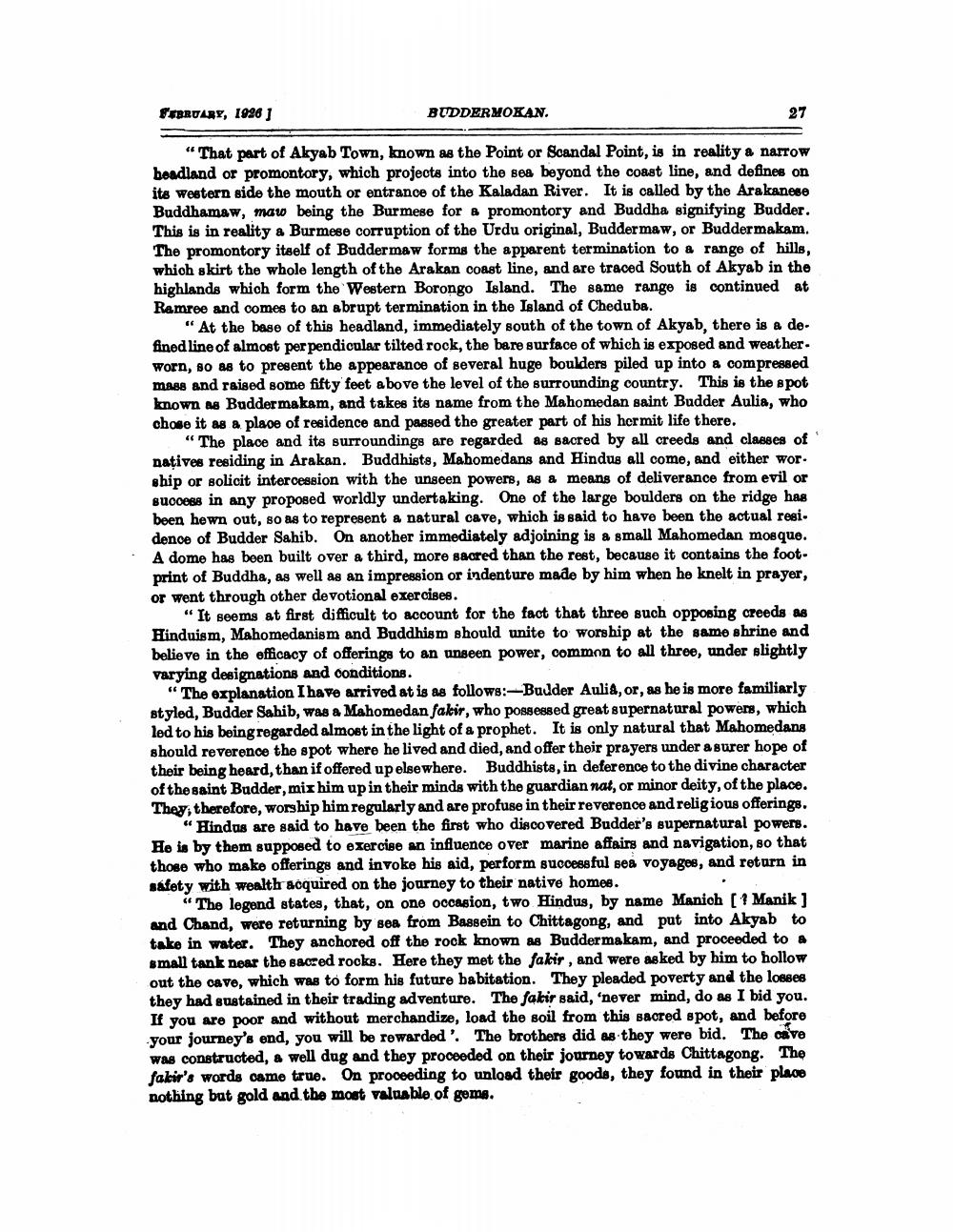________________
BUDDERMOKAN.
FEBRUARY, 1926 ]
"That part of Akyab Town, known as the Point or Scandal Point, is in reality a narrow headland or promontory, which projects into the sea beyond the coast line, and defines on its western side the mouth or entrance of the Kaladan River. It is called by the Arakanese Buddhamaw, maw being the Burmese for a promontory and Buddha signifying Budder. This is in reality a Burmese corruption of the Urdu original, Buddermaw, or Buddermakam. The promontory itself of Buddermaw forms the apparent termination to a range of hills, which skirt the whole length of the Arakan coast line, and are traced South of Akyab in the highlands which form the Western Borongo Island. The same range is continued at Ramree and comes to an abrupt termination in the Island of Cheduba.
27
"At the base of this headland, immediately south of the town of Akyab, there is a defined line of almost perpendicular tilted rock, the bare surface of which is exposed and weather. worn, so as to present the appearance of several huge boulders piled up into a compressed mass and raised some fifty feet above the level of the surrounding country. This is the spot known as Buddermakam, and takes its name from the Mahomedan saint Budder Aulia, who chose it as a place of residence and passed the greater part of his hermit life there.
"The place and its surroundings are regarded as sacred by all creeds and classes of natives residing in Arakan. Buddhists, Mahomedans and Hindus all come, and either wor. ship or solicit intercession with the unseen powers, as a means of deliverance from evil or success in any proposed worldly undertaking. One of the large boulders on the ridge has been hewn out, so as to represent a natural cave, which is said to have been the actual resi. dence of Budder Sahib. On another immediately adjoining is a small Mahomedan mosque. A dome has been built over a third, more sacred than the rest, because it contains the footprint of Buddha, as well as an impression or indenture made by him when he knelt in prayer, or went through other devotional exercises.
"It seems at first difficult to account for the fact that three such opposing creeds as Hinduism, Mahomedanism and Buddhism should unite to worship at the same shrine and believe in the efficacy of offerings to an unseen power, common to all three, under slightly varying designations and conditions.
"The explanation I have arrived at is as follows:-Budder Aulia, or, as he is more familiarly styled, Budder Sahib, was a Mahomedan fakir, who possessed great supernatural powers, which led to his being regarded almost in the light of a prophet. It is only natural that Mahomedans should reverence the spot where he lived and died, and offer their prayers under a surer hope of their being heard, than if offered up elsewhere. Buddhists, in deference to the divine character of the saint Budder, mix him up in their minds with the guardian nat, or minor deity, of the place. They, therefore, worship him regularly and are profuse in their reverence and religious offerings. "Hindus are said to have been the first who discovered Budder's supernatural powers. He is by them supposed to exercise an influence over marine affairs and navigation, so that those who make offerings and invoke his aid, perform successful sea voyages, and return in safety with wealth acquired on the journey to their native homes.
"The legend states, that, on one occasion, two Hindus, by name Manich [ Manik] and Chand, were returning by sea from Bassein to Chittagong, and put into Akyab to take in water. They anchored off the rock known as Buddermakam, and proceeded to a small tank near the sacred rocks. Here they met the fakir, and were asked by him to hollow out the cave, which was to form his future habitation. They pleaded poverty and the losses they had sustained in their trading adventure. The fakir said, 'never mind, do as I bid you. If you are poor and without merchandize, load the soil from this sacred spot, and before your journey's end, you will be rewarded'. The brothers did as they were bid. The cave was constructed, a well dug and they proceeded on their journey towards Chittagong. The fakir's words came true. On proceeding to unload their goods, they found in their place nothing but gold and the most valuable of gems.




